Table of Contents
Q1. A manufacturer manufactures phone. While manufacturing he incur two types of cost – Fixed cost & variable cost. His total fixed cost is Rs.‘x’ annually and he can produce only 1,00,000 units in an year. If he produces 60,000 units, his per unit cost is Rs.9 and if he produces 1,00,000 units, his per unit cost is Rs.7.40. Then, find at what price per unit he should sell 80,000 units, if he wants to earn 20% profit.
(a) Rs.8.4
(b) Rs.8
(c) Rs.9.6
(d) Rs.10
(e) None of the above.
Q2. A man has two items A and B. What is the selling price of item B?
(A) The amount obtained after selling 4 of item A and 1 of item B is Rs. 70. From this amount he either could buy 7 of item A or 1 of item A with 4 of item B.
(B) Profit earned on selling 1 of item B is Rs. 3 and profit % earned on selling 1 of item A is 30 %. Selling price and cost price of item B are Rs. 5 greater than that of item A respectively.
(C) Ratio of profit % earned on A and B is 3 : 2 and ratio of their cost price is 2 : 3 respectively. All profit % , cost price and selling price have integer value.
(a) Either A and B or B and C are sufficient to answer the question
(b) Either A and B or A and C are sufficient to answer the question
(c) Either A and C or B and C are sufficient to answer the question
(d) A, B and C together are sufficient to answer the question
(e) Either only B or A and C together are sufficient to answer the question
Q3. Selling price of two articles is same and shopkeeper claim to get 20% profit on each article but mistakenly he calculates one profit on selling price. If difference of profit he gets on articles is 8 Rs. then find the selling price?
(a) Rs.200
(b) Rs.180
(c) Rs.160
(d) Rs.220
(e) Rs.240
Directions (4-5): A shopkeeper gives a 20% discount on MRP on each ball and if someone bought 45 balls at discounted price, he will also get 15 balls free. Even after selling balls 60 balls on the price of 45, shopkeeper earns 20%.
Q4. Find ratio of MRP of 1 ball to CP[for shopkeeper] of 1 ball.
(a) 2 : 1
(b) 5 : 1
(c) 10 : 1
(d) 3 : 1
(e) 4 : 1

Q6. Aman left City A for City D via City B & City C and Bhanu left City B for City D via City C at the same time, they both reach City C after 5 hours and Aman reaches City D 66 minutes earlier than Bhanu. City D is 180 km away from City C. If Aman is travelling at 72 km/hr, then find the distance between City B and City C is how much more than distance between City A and City B?
(a) 90 km
(b) 165 km
(c) 190 km
(d) 110 km
(e) 140 km
Q7. Ratio of volume of sphere to volume of solid cylindrical toy with hemispherical top is 14 : 3. If radius of sphere is twice of radius of toy, then find the ratio of total surface area of sphere to surface area of the toy.
(a) 9 : 7
(b) 336 : 131
(c) 91 : 69
(d) 151 : 97
(e) 199 : 162
Q8. A boat covers total distance of 360km downstream in three equal parts with the speed of boat be 4x km/hr, 5x km/hr and 7x km/hr respectively. If speed of stream is x km/hr and boat takes total 29.5 hours, then find in what time boat will cover total given distance upstream in three equal parts with three given speeds?
(a) 36 hours
(b) 40 hours
(c) 45 hours
(d) 48 hours
(e) 54 hours
Q9. The sides of triangle PQR are ‘p’ cm, ‘q’ cm and ‘r’ cm and the sides of triangle ABC are ‘a’ cm, ‘b’ cm and ‘c’ cm. If p² + q² + r² = 100, a² + b² + c² = 100 and pa + qb + rc = 100 then the triangles PQR and ABC will be
(a) of equal perimeter
(b) of equal area
(c) similar
(d) congruent
(e) all of the above
Q10. Inside a square plot a circular garden is developed which exactly fits in the square plot and the diameter of the garden is equal to the side of the square plot which is 28 meters. What is the area of the space left out in the square plot after developing the garden?
(a) 98 m2
(b) 146 m2
(c) 84 m2
(d) 168 m2
(e) 68 m2
Directions (11-15): Given below is the pie-chart which shows the percentage distribution of total population of six villages in year 2016 and line graph shows the percentage of males out of total population in each village.
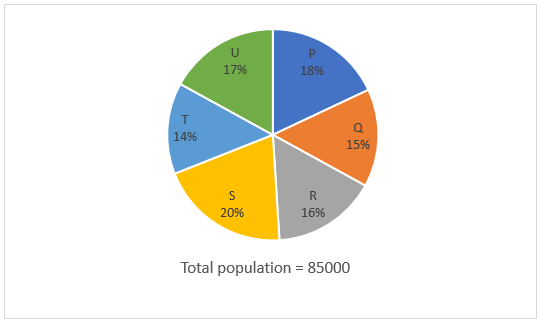
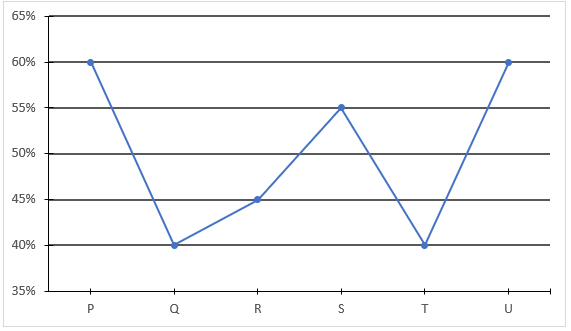
Q11. What is the ratio of total female from village P and Q together to the total males from village S and U together?
(a) 81 : 106
(b) 82 : 107
(c) 106 : 81
(d) 112 : 143
(e) None of these
Q12. If 20% females in village R and 33⅓% of males in village P are ill due to disease then females who are not ill from village R is what approximate percent of males who are not ill from village P.(approximately)
(a) 100%
(b) 105%
(c) 80%
(d) 88%
(e) 98%
Q13. What is the ratio of sum of females from village Q and T together to the total population of Q.
(a) 146 : 111
(b) 111: 146
(c) 25 : 93
(d) 497 : 500
(e) 29 : 25
Q14. Total female from village S and T together are what percent of total population from village R and T together
(a) 50%
(b) 54%
(c) 47%
(d) 58%
(e) 62%
Q15. If in year 2017 total population of village P increases by 25% whereas female’s population increases by 30% then by what percent male population of village P increases or decreases in 2017 over year 2016. (approximately)
(a) 16%
(b) 37%
(c) 28%
(d) 12%
(e) 22%
Practice More Questions of Quantitative Aptitude for Competitive Exams:
Solutions



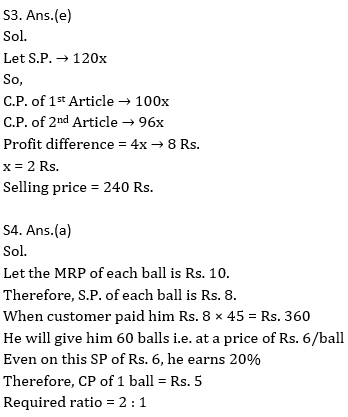

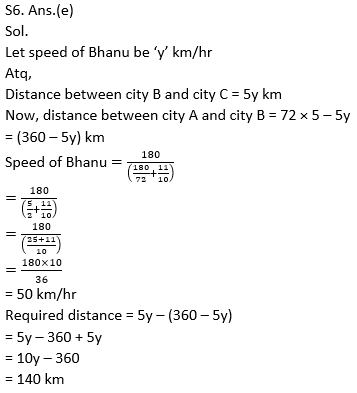
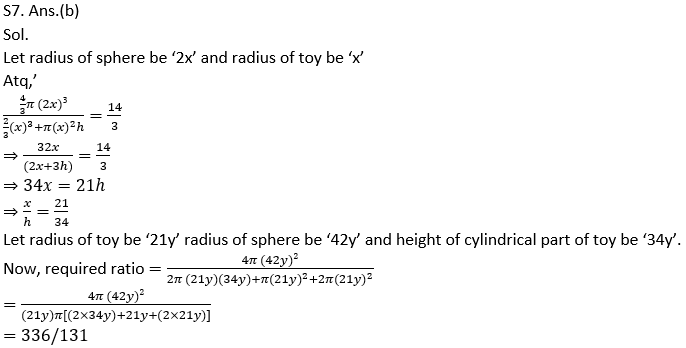
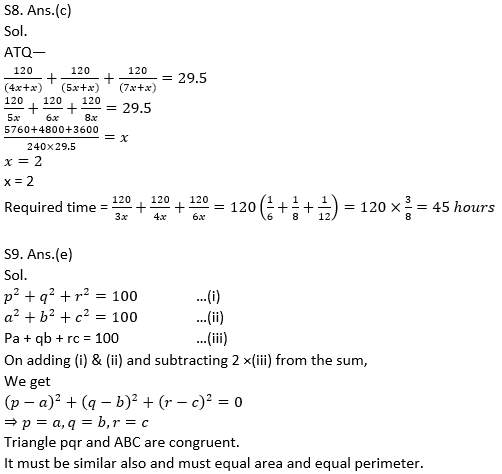





Practice with Online Test Series for Bank Mains 2021:
Click Here to Register for Bank Exams 2020 Preparation Material

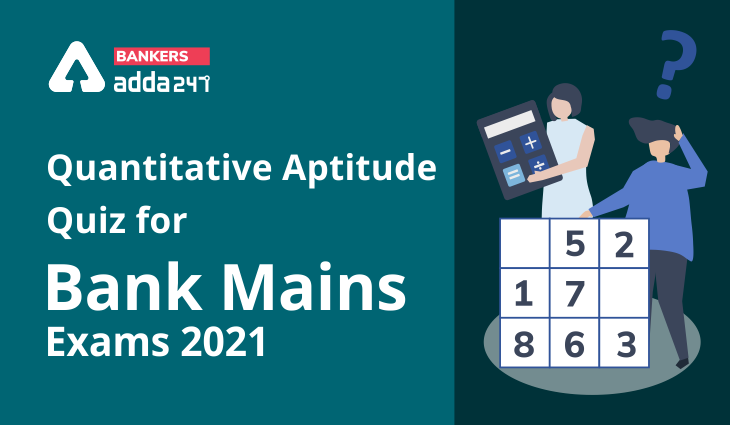


 GA Capsule for SBI Clerk Mains 2025, Dow...
GA Capsule for SBI Clerk Mains 2025, Dow...
 The Hindu Review October 2022: Download ...
The Hindu Review October 2022: Download ...
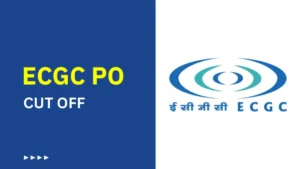 ECGC PO Cut off 2025 Out, Check Final Cu...
ECGC PO Cut off 2025 Out, Check Final Cu...




